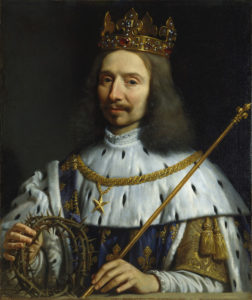
Today we continue our regular series called “Learning from the Saints.” Our guide is expert Bert Ghezzi, a dear friend of mine and the author of numerous books including Voices of the Saints, Saints at Heart, and Discover Christ: Developing a Personal Relationship with Jesus.
His more recent books are The Power of Daily Mass and The Heart of Catholicism. You can learn more about Bert and his work at BertGhezzi.com.
Today, Bert profiles St. Louis IX, the patron of the death of children, difficult marriages, parents of large families, prisoners, and sickness.
Had history not left us an accurate record of King Louis IX’s reign, we might be tempted to regard his story as religious fiction. Imagine a king who put God first, who would rather die a leper than commit one mortal sin, who prayed the divine office daily, who often personally waited table for his poor guests, and who waged war only to build peace—and you would have a snapshot of Saint Louis IX.
 During his long reign in France from 1235 to 1270, Louis IX presided over a religious and cultural renaissance. For example, he established three monasteries, supported the foundation of the Sorbonne, and sponsored the construction of great Gothic cathedrals. Twice Louis went to war against Henry III of England, but instead of pressing for total victory, he negotiated a settlement that he believed would guarantee peace.
During his long reign in France from 1235 to 1270, Louis IX presided over a religious and cultural renaissance. For example, he established three monasteries, supported the foundation of the Sorbonne, and sponsored the construction of great Gothic cathedrals. Twice Louis went to war against Henry III of England, but instead of pressing for total victory, he negotiated a settlement that he believed would guarantee peace.
If we could ask John of Joinville, his biographer, to name the king’s defining trait, I think he would say “just judgment.” In the following selection, for example, Joinville describes the king’s practice of personally settling his subject’s cases:
“Often in the summer he went after mass to the wood of Vincennes and sat down with his back against an oak tree, and made us sit all around him. Everyone who had an affair to settle could come and speak to him without the interference of any official. The king would ask, ‘Is there anyone here who has a case to settle?’ All those who had would then stand up and he would say, ‘Quiet, all of you, and your cases will be dealt with in turn.’
“Then he would call my Lord Peter of Fontaines and my Lord Geoffrey of Villette and say to one of them, ‘Now give me your judgment in this case.’
“When those who spoke for him or for the other part said anything which he saw needed correction, he corrected it himself.”
In 1234, Louis IX married Margaret of Provence, to the great displeasure of his mother, Blanche of Castile. She detested the young queen and did all she could to make the couple miserable. For many years, for example, she forced them to live in separate apartments, one situated above her own rooms and another below. But that did not seem to stop their meeting, as Margaret bore Louis IX eleven children. Relief came only when Blanche died in 1254.
Louis IX lead two disastrous crusades against the Muslim invaders of Palestine, but we must not be too quick or too harsh in judging him. His sole motive seems to have been bringing aid to Christians who were suffering under their Saracen conquerors. And he tried, though unsuccessfully, to restrain the violence of the crusading army. On the second expedition, Louis IX caught typhoid fever at Tunis and died on August 24, 1270.
Louis IX had an easier time ruling an entire kingdom with justice than the mayor of a city like Miami has governing today. Things moved more slowly in the thirteenth century, fewer people were alive, and events were somewhat more manageable. But even though everything is bigger now and impossible to control, contemporary governors would do well to imitate the saint-king’s love of God and his justice. The results just might seem too good to be true.
Read more from Bert at his website www.BertGhezzi.com, or check out his many books on Amazon.
